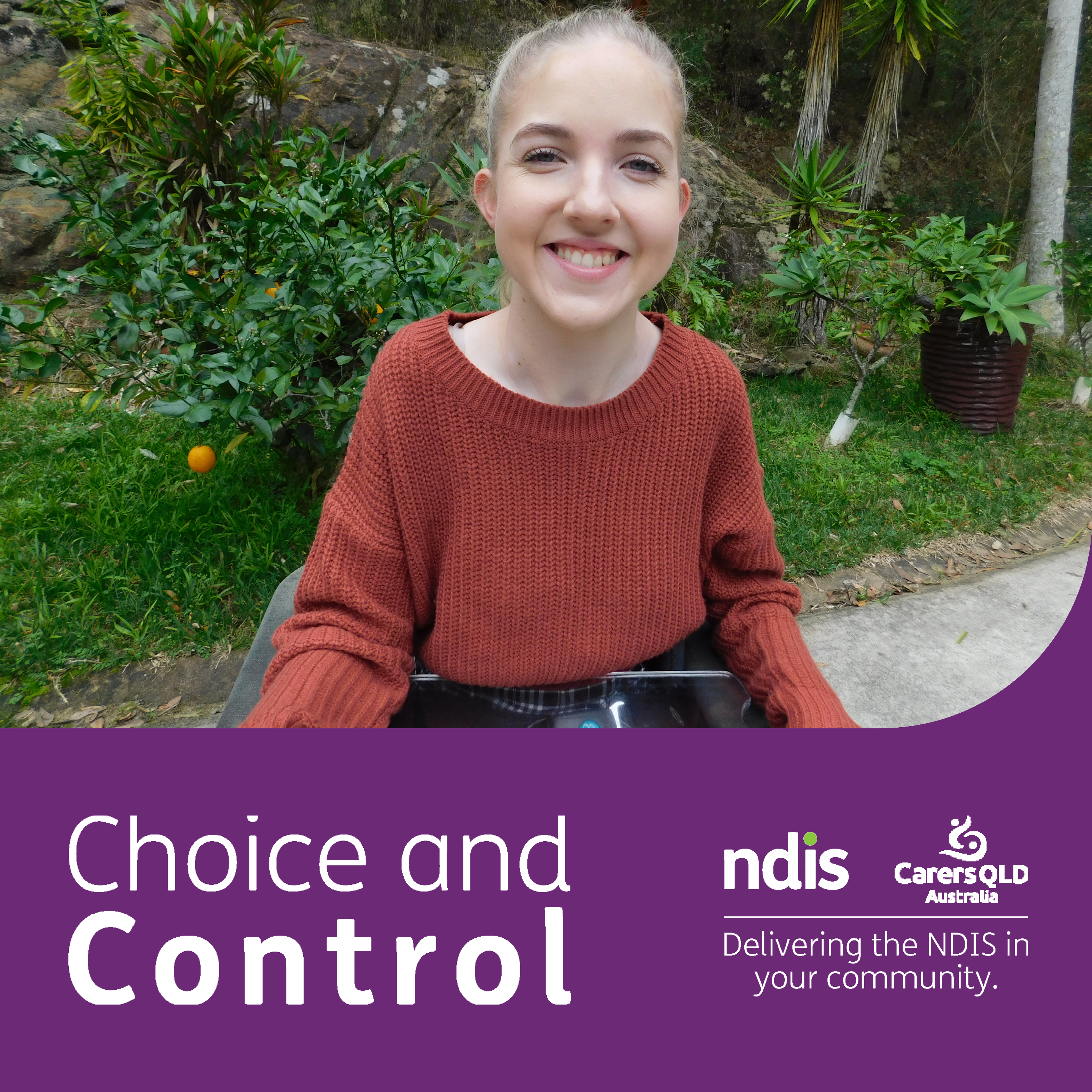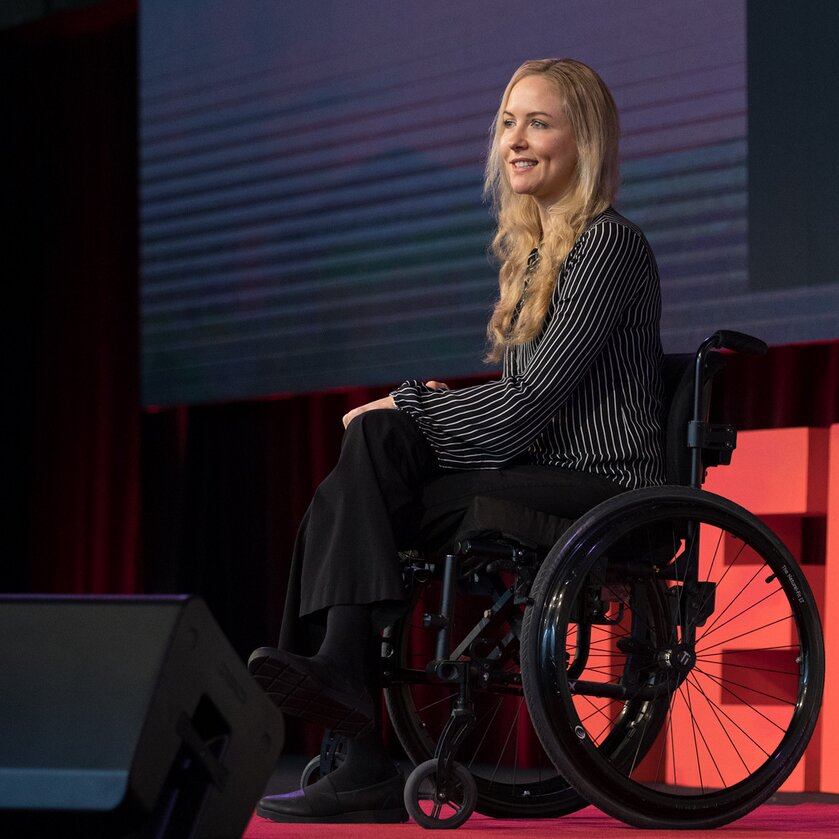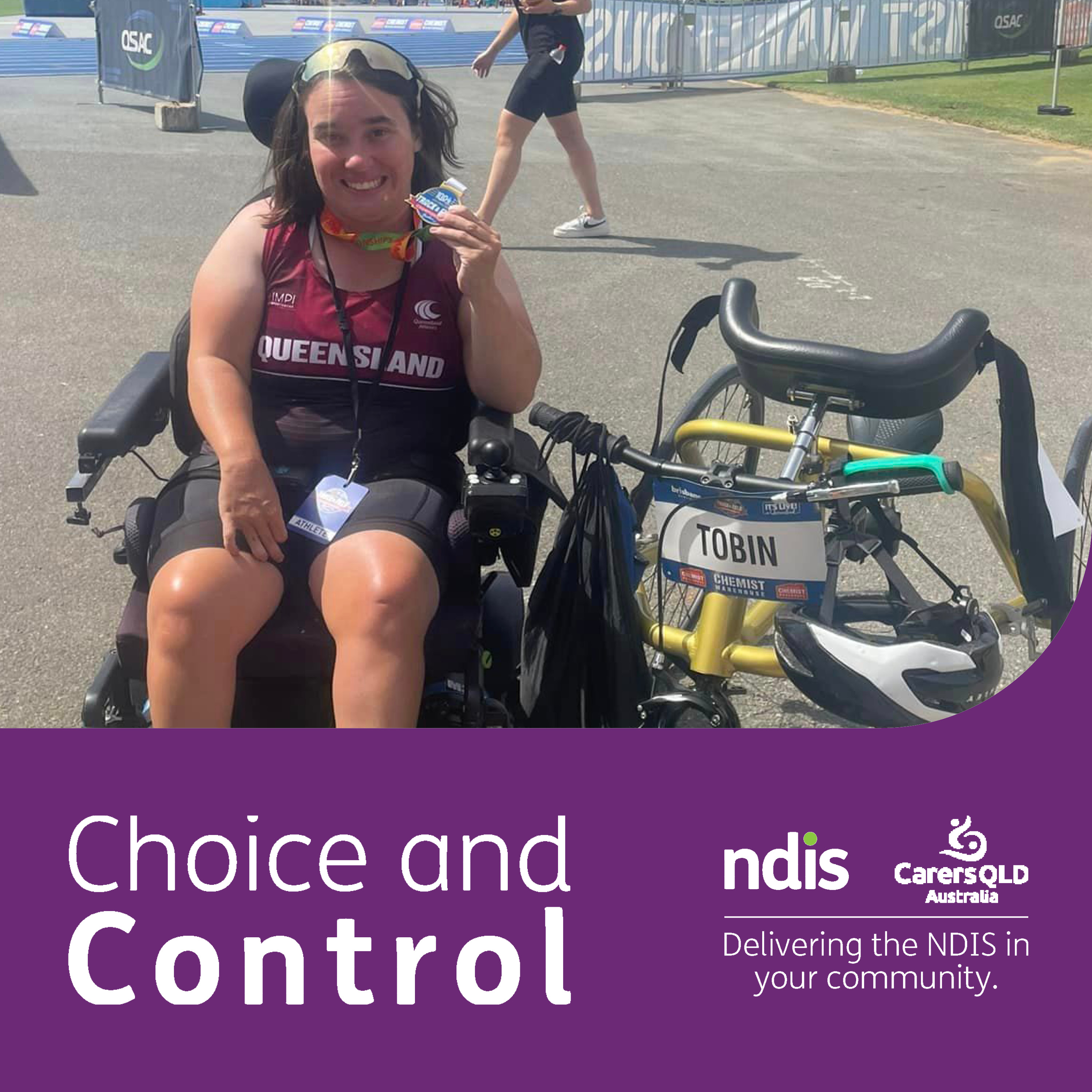Speaker 0 00:00:05 Choice and control a podcast, celebrating people with disability in this season, we're talking about access inclusion and the national disability insurance game. This podcast series is brought to you by carers Queensland and dis local area coordination partner in the community.
Speaker 1 00:00:23 Good day, I'm Jody van dewatering. Today. I'm talking to Amanda Fraser, an athlete whose career included the Sydney 2000 Paralympics outside the pool and the field, her employment experiences have been a mixed bag, but now she's found the career. She loves working with other people with disability. As we sit down to chat, she's a local area coordinator with carers Queensland's team in Rockhampton.
Speaker 2 00:00:47 I grew up in Emerald about 18 months after I was born. I was diagnosed with cerebral palsy. Um, I've got two younger sisters, um, who were my protectors. I call them my protectors. And, um, basically just grew up in a really small sporting family, really. So the sporting family, um, you know, play basketball and I was in a hugely basketball orientated community. And when I got to the age of 12 or 13, I was told, Hey, you can't play basketball anymore. Cause you can't dribble with both hands. So that was quite devastating for me being told that I couldn't do something that my family had always done. And then my parents quickly tried to have a look around at other sports. Um, and they found swimming. Um, mainly because there was no coach that was willing to coach me in athletics. Yeah. And then, so when I did the, um, swimming, I started off in, someone said, Oh, you know, there's this thing called the Paralympics.
Speaker 2 00:01:54 And I was like, Oh, well, okay, well, that's what I want to do. You know, I watched the Olympics every four years and have athletes passed it on my walls and that's what I want to do. And so my education probably lacks in, in those sort of areas. So I wasn't focused on, on my education as much because I was probably told that I wasn't smart enough. Um, I think when I got to grade 10, because I was absent for swimming so often traveling over the seas and seeing the world and competing, yeah. They basically wanted to put me into a special needs unit. So I, well, my mum quickly decided no that's not going to happen. And we moved to Rockhampton from there and continued on the sporting journey. Um, ended up finishing, passing most of my grades most, not all, but, um, I think for me going to the Paralympics, um, in Sydney, so that was 20 years ago next weekend, which is scary, um, was just this real awakening of, Hey, you can do this.
Speaker 2 00:03:01 You can really be successful and you can achieve things. And, um, Sydney, 2000, I think it was my awakening and, um, built my confidence. Um, my mum sort of stood in there in the grand stands and saw me in this skimpy little, uh, Kasi or swimmer waving my hands, telling people to cheer me on and, um, how it was, you know, that shy little, you know, 18 year old doing that. So, uh, yeah, it really, for me, that was the awakening. And then I moved to Canberra in 2001 after meeting, I think kind of pigeonholed into childcare, sort of teacher aid position through, um, the employment sort of agencies. They sort of got me that job. And
Speaker 3 00:03:49 Was that where your passions were? Did you sort of go in thinking, Oh, I would like to work with children?
Speaker 2 00:03:53 No, definitely not. No. I mean, I love children. Um, but you know, I think I was probably, yeah, I, yeah, I didn't know what I wanted to do at that point. So I think it was just, well, this has been easy for you, so do this and the expectations I think were yeah, fairly low on the job sort of markets. So, you know, this is what you can do. So let's put you in here and then we'll tick a box. So
Speaker 3 00:04:19 It sounds like had you not had that amazing outlet through your athletics life could have been fairly
Speaker 2 00:04:27 Dull gray. Yeah, definitely. And I, yeah, I will be forever thankful for that person saying, Hey, there, there was this thing called the Paralympics because without it, my life would be completely different. I think
Speaker 3 00:04:41 You ended up in Canberra, you're working in childcare sort of just because that's where you landed. How did your career progress from there? Did you think about getting into something SplitRail licensed since that was where your talents were?
Speaker 2 00:04:53 Um, I went into sort of the swim coach arena. Um, and then I went into admin. I worked at, um, the Australian Institute of sports, um, shop. I worked in the tours department, so I did the tours. Um, I really liked the tours because I got to meet different people and, um, share my story a little bit. And, um, that was fun. And then I got a job with Telstra. Um, so I worked in sales, in a licensed shop, which was awesome. And I did that throughout my athletics career because by that time I was trialing throwing shot, put and discus. So that was fun and a huge learning curve because being part of the Australian Institute of sport was just an amazing facility. All the athletes that you got to meet, all that sort of stuff, it was a great experience. So,
Speaker 3 00:05:45 And how well was the Australian Institute of sport tooled up to work with the para athletes?
Speaker 2 00:05:51 Ah, brilliant. Yeah. I mean, we had the best coaches there and from my point of view, I thought that I learnt athletics from the best I really did. And they were, um, innovative and, um, had imaginations and really just supportive and, and listening and engaging. So it was, it was great. Yeah. Inclusive, I guess. Yeah. But I think that, um, you know, that, that area was just amazing because you were with the able-bodied athletes. So every day you would walk around. I mean, in the beginning I was seeing Michael klim, you know, two or three times a week and you're just like, Oh my God, that's Michael Clune. Just over there people today probably don't remember him like a clip. It was one of the ones smashing the guitars with the Americans. So, you know, an Alexander Popoff and Patrick Johnson and all those guys were just amazing. So it was,
Speaker 3 00:06:46 And you're just bopping around rubbing shoulders with your heroes, what things for inspiring.
Speaker 2 00:06:51 This is where he was like, Oh my God, I can't even remember. I remember going into the gym is really changed. My idea of who a boxer really was. Like, he basically, um, said to us, there was a group of probably four or five athletes with disabilities doing gym work. So we were lifting heavy on the bench and, you know, throwing weights around and he said, Oh God, you guys are amazing. Like, I really like, you're just out there doing, doing what you do. And, um, from my point of view, I, um, yeah, it was really nice to be recognized by someone like him. And yeah, it was cool
Speaker 3 00:07:31 While that level of inclusion and respect was happening in the AIS. What was happening in your outside of sport career? Where w was that same feeling of being included and valued? Definitely not.
Speaker 2 00:07:43 Um, I always felt like in my work career, I, I mean, I hadn't studied, so that was the issue I think. And I really, again, I think throughout my education, I didn't feel smart enough, so I didn't want to go back and study because if you've been told that you can't do something for long enough, then you know, you're not going to want to do it. So, and I didn't, and I stayed away from it for a long time. So I just worked to earn the money. And then, you know, I eventually, after I left Canberra and I retired, um, a couple of years later, someone said to me, why don't you do personal training? And again, that awakening, it was almost like that second sort of opportunity in the, in the employment field. So, um, I went through the certificate three and the certificate four, um, in personal training and, um, I was the most successful trainer.
Speaker 2 00:08:37 So I got awarded the, the champion trainer of, of the course and that wasn't just like the performing the exercises part that was the assignments and quizzes and all that sort of stuff to be recognized, not only on the sporting, a ring now, but, um, academically, it was amazing. Like I just have never felt that way before. And, um, I can remember getting awarded that award and it was just shocked because I was just like, how, how did this happen? I didn't think that I was smart. I literally just didn't believe that I was smart enough to, to be that person. But it just shows that when you're passionate about something, you can really Excel. Um, so I think sport and disability is probably where I Excel
Speaker 3 00:09:25 Working as a personal trainer. Did you gravitate towards people with disability or where did that take you
Speaker 2 00:09:31 Two, but I worked in the middle of the city in Brisbane and there just wasn't enough people accessing the gym in Brisbane. And, uh, I guess our Lyft was probably hidden by workplace. So it was really hard to see where the access was, although we were sort of ready and willing to have people with disabilities there. And I did train a couple of my friends and, you know, show them to do squats when they, you know, um, didn't particularly have leg strength. So, um, that was amazing. It was a great experience, but, you know, they were my friends
Speaker 4 00:10:02 Well, so they couldn't walk afterwards. And were they still your friends after that?
Speaker 2 00:10:16 I, I think that, you know, within that dynamic, I got to meet so many people from so many different walks of life as well. And I felt like I was really lucky because I worked in Brisbane city because, you know, you're, you're working with doctors and, um, you know, occupational therapists and, um, you know, people that work for work cover and, you know, lawyers and all that sort of stuff, so amazing different. And then students as well. So yeah, it was a really dynamic, um, I miss that sort of, you know, different story to different people, you know, and, and that's what I love about the Lac role is that you do get to meet different people. And if you can hear their story every day of the week, then that's what I love. I love listening to people's stories and trying to help them.
Speaker 3 00:11:05 And what was the process then from working in the gym in Brisbane to up in Rockhampton and working as a local area coordinator? Yeah,
Speaker 2 00:11:13 So I moved back to Rockhampton.
Speaker 4 00:11:19 Um, so
Speaker 2 00:11:21 I, um, reconnected with a bloke that I went to high school with, and I never said that I would move for a man. And, um, I had just completed the Kokoda challenge in 2017 and we reconnected after that. And I just thought, well, if I don't move now for a minute, and then I never will. So I took the opportunity and have having the personal training background. I just thought, well, I can do this anywhere. And he's got his family here, he's got a son. So you know, his life great job. Um, so for me, it was easier for me to make the move. And then about, probably about four months later, this job came up and a lady that worked here actually said, Oh, you should apply for this role. And I did. And the rest is history because I got a foot in the door. I don't know how, but I got a foot in the door
Speaker 3 00:12:17 And that must've been quite a leap of faith because this was before the NDIS had started rolling out in Queensland. So we didn't necessarily understand once a local area coordinator was going to be.
Speaker 2 00:12:29 Yeah. Yeah. I think I didn't really know what the role was, but I knew that I could bring to the role like that. Um, being able to listen, being able to learn about different disabilities, but being able to support people and encourage people. I have, um, great aspirations and I obviously dream big for everyone. And I think that, you know, if you can show people that there is a light at the end of the tunnel, then, um, you know, isn't that what we're all here for, for people.
Speaker 3 00:12:57 Well, who haven't had anything to do with the indis before, could you just explain as an LIC, what do you do? Where do you sit within the NDIS?
Speaker 2 00:13:06 Well, probably the most important part is that we have to be seen as impartial, but we get to know the participants, so we get to share their story. So we paint the picture for the agency. So when we paint that picture, we've got to try and get all of the information out of the participant and their family. So again, trying to figure out, you know, what entices them to, you know, or what encourages them to be better, or, you know, what are they passionate about so that we can try and figure out where they fit in society so that we can try and make that job happen or, or, uh, make that social group happen, like joining a different group that does art or craft or competing in archery or, you know, whatever. I think there's so many avenues in Rockhampton, wheelchair basketball. Yeah. So, uh, I think we're very fortunate in Rockhampton to have, um, numerous organizations that are out there to help people with disabilities. We've just got to find the right fit for the right person,
Speaker 3 00:14:06 Finding that fit because you don't necessarily know what's out there. And on the other hand, if you are running a sporting club or a hobbyist group of some sorts, you may have people who want to join and you don't realize how you're not accessible because you've never thought about it.
Speaker 2 00:14:22 And that's a scary thought. And, you know, I think that it's just about asking the people with disabilities, how can we help you to be included? So it's not about saying no straight away it's, well, how can we make that introduction? How can we look at what we do? You know, riding a horse, do we bring a ladder over? I don't know, like, you know, to get someone up onto, uh, onto a horse. So it's about finding the ways. Um, I often say that people with disabilities are really good, you know, cheating because, you know, we like to cover your disabilities up. So they're the people that have the answers, you know, and if they don't have the answers, then someone that is trained like an occupational therapist would be able to figure that out for us,
Speaker 3 00:15:05 Something that's come up over and over again in this season of the podcast is the importance of the attitude. Like you can have the ramp, you can have the lift, but you also need the attitude of everyone's welcome here. And it's our job to make it work, not to find a reason to not make it work. Yeah.
Speaker 2 00:15:20 Yeah, absolutely. I think that, you know, you've just gotta be open to it. And I mean, I see that everyday going to the gym, like I go to the gym and I feel included every day and I can't do majority of the exercises that everyone else can do, but you know, to be able to have it a regression or a modification so that I can still do five rounds of the same, you know, workout then. So be it. So, yeah.
Speaker 0 00:15:46 Thanks for joining us at choice and control a carers Queensland podcast. For more information about carers Queensland, the national disability insurance game, or the local area coordination program, please contact us
[email protected]. Or you can catch up with us on Facebook search for carers Queensland. Andy dis. This podcast is a place for people with disability to share experiences, stories, and achievements. If you have a story you think we should know about, please contact us through the carers Queensland inquiries line at one 300 triple nine, six, three six, or email CQ dot
[email protected] until next time. Thanks for listening.


